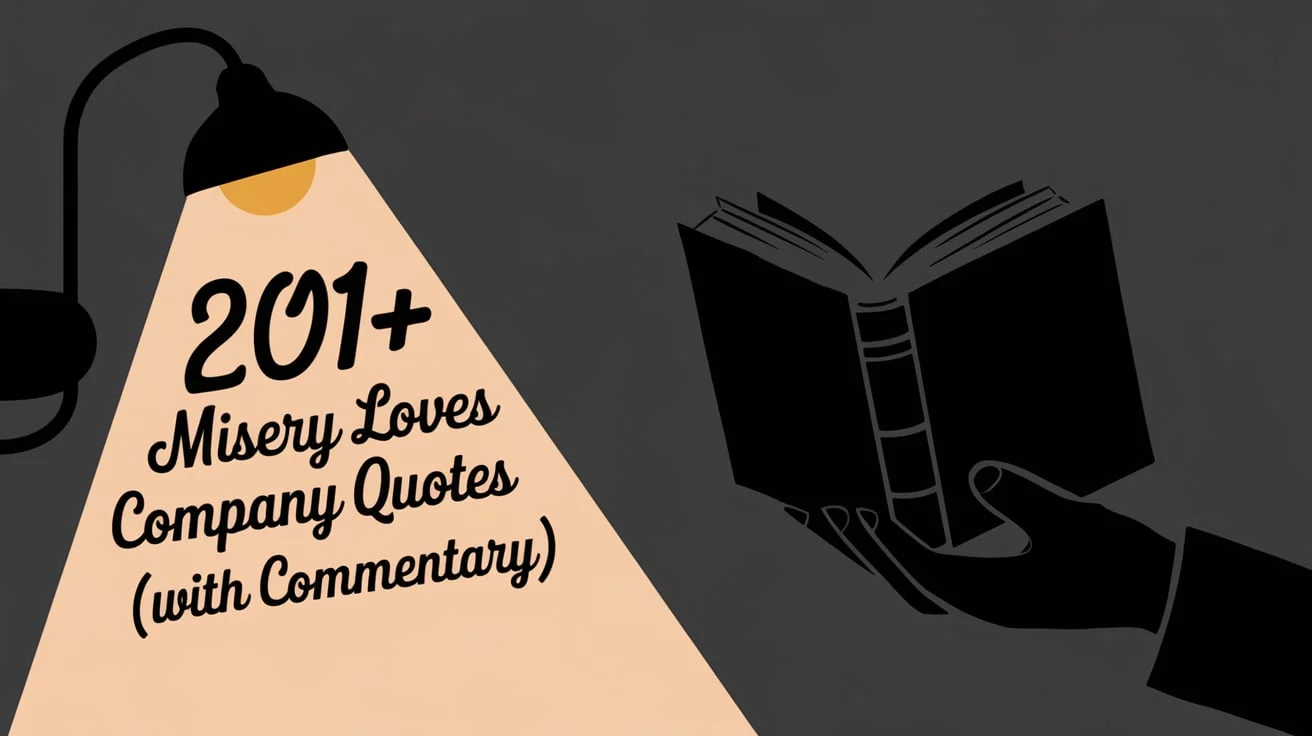Discover thought-provoking Misery Loves Company Quotes that reveal the power of connection, empathy, and shared struggles. “Misery Loves Company” is a well-known adage that reflects the tendency for people who are unhappy to seek out the company of others who share their discontent.
The idea is that suffering, whether emotional or physical, feels somewhat more bearable when it is shared with others who understand or relate to the experience. In this collection of quotes, we will dive into the different interpretations of this saying, exploring both the dark side and the potential for shared empathy and connection.
The Dark Side of Misery Embracing the Negative
- “Misery doesn’t just love company; it thrives on it.”
- “When you’re miserable, it’s easier to find others who want to share in your suffering.”
- “Pain is often more bearable when someone else is experiencing it too.”
- “Sometimes, misery feels less lonely when you have someone to wallow in it with.”
- “Amid the despair, we seek others who validate our pain.”
- “Misery loves company, but it doesn’t always lead to healing-it can just prolong the agony.”
- “People who are unhappy often cling to others in the same emotional state.”
- “In misery, the need for understanding can overshadow the desire for resolution.”
- “Shared misery may give the illusion of comfort, but it rarely offers real relief.”
- “The company of others in misery sometimes becomes a trap, where neither person can heal.”
- “We’re often drawn to those who share our pain because it validates our suffering.”
- “Misery loves company, but it’s rarely looking for a solution or a companion.”
- “Pain can make us feel isolated, but finding others who share it can make us feel less alone if it’s fleeting.”
- “When everyone around you is miserable, it’s hard to imagine that happiness is even possible.”
- “Misery’s company is like a blanket that offers temporary comfort but leaves you cold in the long run.”
- “Being miserable together doesn’t make the pain any less real; it just changes the nature of the loneliness.”
- “The connection that misery creates is often based on mutual suffering, not mutual understanding.”
- “Misery thrives in numbers, but it rarely dissolves with the presence of others.”
- “Birds of a feather flock together-especially when both are weighed down by sorrow.”
- “Misery is a silent plea for connection, but its company doesn’t always heal the wounds.”
Empathy in Misery Shared Suffering and Understanding
- “Misery loves company, but it also craves empathy, not just shared suffering.”
- “When two people are in pain, understanding each other’s suffering can create a bond that transcends misery.”
- “It’s not just misery that loves company-it’s the empathy that connects people through shared experience.”
- “Shared sorrow can be comforting when it’s met with compassion, not just commiseration.”
- “When misery meets empathy, it has the potential to transform into healing.”
- “Misery is easier to bear when you know someone else truly understands the depths of your pain.”
- “Misery loves company, but it needs understanding to evolve into something greater than just suffering.”
- “Sometimes, the greatest solace in misery comes not from the company, but from the empathy shared.”
- “The real power of misery lies not in shared sadness, but in the connection of shared understanding.”
- “In the company of others who understand your struggle, misery can be the bridge to deeper connection.”
- “Suffering alone feels like isolation, but when misery meets empathy, it becomes a space of mutual healing.”
- “Misery loves company, but the company of those who offer empathy can turn pain into growth.”
- “It’s not enough to be miserable together-you must be willing to listen and support each other to heal.”
- “Empathy in the face of misery transforms it from a burden to a shared journey.”
- “Misery loves company, but empathy makes it bearable and, eventually, it helps us move forward.”
- “True connection in misery is born when people listen and understand, not just when they share the same grief.”
- “While misery loves company, it is through empathy that true healing begins.”
- “When we share our pain with others who show understanding, misery becomes a shared moment of growth.”
- “The company misery seeks is one of mutual empathy, not just the solace of familiar sadness.”
- “In the right company, even misery can be a stepping stone toward mutual healing and understanding.”
Misery as a Temporary Bond Relationships Born from Pain
- “Misery often brings people together, but the bonds it forms may be temporary unless they evolve into something deeper.”
- “Sometimes, misery is the spark that ignites a relationship, but only empathy can make it last.”
- “In times of distress, people find comfort in each other’s company, but the true test comes after the pain subsides.”
- “Pain creates a temporary bond between souls, but it is the shared growth that sustains the connection.”
- “While misery can create a sense of camaraderie, the strength of that connection is tested when the pain begins to fade.”
- “Misery may pull us together, but it’s kindness and understanding that keeps us connected.”
- “People often seek out others in misery, but true relationships are born when that pain is met with care.”
- “When pain fades, the real nature of the relationship is revealed it was built on shared suffering or mutual understanding.”
- “Shared misery can create an initial bond, but it is kindness and empathy that allow it to grow into something deeper.”
- “Misery can bind people together temporarily, but it is empathy and love that make relationships last.”
- “In misery, people find refuge in one another, but it’s the aftercare of emotional support that defines a lasting bond.”
- “Pain may make us vulnerable, but only trust and understanding can build something lasting from that vulnerability.”
- “The comfort of shared misery is fleeting; it is empathy that transforms it into a lasting connection.”
- “Misery forms temporary alliances, but understanding builds long-lasting relationships.”
- “When misery fades, the only thing left is the strength of the bond forged in that pain.”
- “Pain brings us together, but it’s the healing that makes us stronger.”
- “Misery creates the initial connection, but only compassion ensures it survives after the storm.”
- “Sometimes, the hardest part is moving past the misery and learning to live together in a space of mutual care.”
- “Misery loves company, but it is love and understanding that sustain the company long after the pain is gone.”
- “What begins in misery can bloom into something beautiful with care, understanding, and patience.”
Misery and Growth How Shared Struggles Can Lead to Strength
- “Misery can break us down, but shared struggles can build us back up stronger than before.”
- “When we experience misery together, we become stronger through the collective resilience we share.”
- “Shared misery has the potential to forge bonds of strength, turning pain into a source of empowerment.”
- “The struggles of misery can lay the foundation for personal growth when met with mutual support.”
- “Misery may knock us down, but it is through shared strength that we rise again.”
- “In the company of those who share our burdens, we discover untapped reserves of strength.”
- “Misery loves company, but it’s the shared resilience that makes it a catalyst for growth.”
- “Through the pain of misery, we learn the depth of our strength, often with the support of others.”
- “What misery takes away, shared strength gives back, making us more resilient than before.”
- “Misery tests us, but growth comes from how we support each other through the darkest times.”
- “In misery, we find our limits, but in shared growth, we discover how much stronger we truly are.”
- “Misery shows us our vulnerabilities, but shared resilience reveals our hidden strengths.”
- “Misery is a teacher, and in the company of others who learn with us, we grow stronger together.”
- “Through shared pain, we cultivate a deeper understanding of ourselves and each other, turning misery into strength.”
- “Misery can crush us, but it can also be the soil from which growth and resilience sprout.”
- “Through the struggles of misery, we develop empathy and strength, both for ourselves and others.”
- “Misery doesn’t just break us-it has the potential to shape us into something stronger, especially when shared.”
- “The shared experience of misery can ignite a collective strength that propels us forward in life.”
- “When misery is shared, it becomes the foundation for personal growth and mutual empowerment.”
- “Misery loves company, but growth is found in the strength that we find together in the face of adversity.”
Misery and Humor Finding Light in the Dark
- “Misery loves company, but sometimes the best way to deal with it is to laugh together.”
- “Laughter is a way to soften the edges of misery and make it more bearable.”
- “Humor doesn’t eliminate misery, but it can provide a moment of relief in the darkest times.”
- “When misery finds company, laughter can be the balm that heals the emotional wounds.”
- “Misery can cloud our thoughts, but humor often clears the fog, offering perspective and relief.”
- “Sometimes, the most powerful remedy to misery is laughter shared with others who understand.”
- “Amid misery, humor can remind us that we are still capable of joy, even in the smallest of moments.”
- “Misery loves company, but humor in that company can be the thread that holds us together.”
- “Laughter might not cure misery, but it certainly makes it more manageable.”
- “In the darkest times, humor can act as a bridge to connection, lightening the load of shared misery.”
- “Misery and humor make strange companions, but together, they offer a powerful way to cope with pain.”
- “When misery strikes, humor can offer a temporary escape, allowing us to breathe and find perspective.”
- “Laughter in the face of misery doesn’t diminish the pain simply lightens the heart.”
- “Sometimes, the best way to confront misery is by laughing at the absurdity of the situation.”
- “Humor doesn’t negate the misery, but it makes it easier to bear, especially when shared with others.”
- “In misery, we find a way to laugh at ourselves, which is often the first step toward healing.”
- “Misery loves company, but humor is the seasoning that makes it a little more palatable.”
- “Laughter amidst misery isn’t an escape-it’s a recognition that we are more than our pain.”
- “Even in the darkest moments of misery, humor can offer a flicker of light.”
- “Misery might love company, but humor is the key to surviving it with grace.”
Misery and Isolation The Paradox of Seeking Company in Pain
- “Misery loves company, yet often, the deepest misery is found in isolation.”
- “When we are at our lowest, we tend to seek others, but it’s the silence that sometimes makes the pain worse.”
- “Misery loves company, but isolation often becomes its true companion.”
- “In our darkest times, we may crave connection, but the fear of vulnerability can make us pull away.”
- “Misery draws us toward others, but it can also push us into a shell of isolation where we feel misunderstood.”
- “The company we seek in misery often mirrors our need for validation, not for healing.”
- “Misery can trick us into thinking that others will make us feel better, yet sometimes their presence only amplifies our loneliness.”
- “It’s a paradox- misery wants company, but the emotional burden makes us retreat further into ourselves.”
- “Though misery loves company, it can often leave us feeling more isolated, as no one truly understands the depth of our pain.”
- “Amid misery, seeking others can feel like a lifeline, but isolation can provide the space needed for true healing.”
- “Misery might be easier to carry with others, but sometimes, it’s in isolation where we find the strength to move forward.”
- “The need for company in misery is natural, but the key to healing may lie in finding solace within ourselves.”
- “While misery can bring us closer to others, it’s the self-reflection that often leads to the greatest personal growth.”
- “The presence of others in misery can be comforting, but it’s often the absence that allows us to reflect and heal.”
- “Misery loves company, yet sometimes the most important company we need is our own.”
- “In the company of misery, we often forget that true healing requires solitude and self-understanding.”
- “When surrounded by others who are also in misery, it’s easy to forget the importance of finding peace on your own.”
- “The company misery keeps is often fleeting; what remains is the internal journey of healing.”
- “Isolation in misery can feel like a punishment, but it may be a necessary step toward emotional recovery.”
- “Misery seeks company, but real healing is found when we face our pain alone and learn to carry it with grace.”
Misery in the Workplace Shared Struggles in Professional Life
- “In the workplace, misery often finds company in shared stress and burnout.”
- “Misery loves company, especially when it comes to the pressure of deadlines and unrealistic expectations.”
- “The workplace can be a breeding ground for shared misery, but it’s empathy and support that make the difference.”
- “Employees often find solace in venting about their shared frustrations, but true solutions come from understanding and cooperation.”
- “In a toxic work environment, misery spreads like wildfire, affecting everyone involved.”
- “Misery in the workplace is a shared burden, but it’s the support and solidarity that help ease the load.”
- “Teamwork can sometimes feel like misery shared, but collaboration can also turn suffering into success.”
- “In the professional world, misery often loves company because it helps validate our struggles against corporate pressures.”
- “Misery in the office is a common experience, but it’s the willingness to confront it together that leads to growth.”
- “While misery in the workplace can unite us, it’s compassion and understanding that create positive change.”
- “Misery may thrive in a high-pressure job, but it’s the bonds we form with colleagues that help us survive.”
- “In professional misery, the company we keep can either reinforce negativity or provide a platform for healing.”
- “Workplace misery often comes from shared demands, but the solution lies in shared goals and mutual respect.”
- “Misery may love company in the office, but it’s the collaboration and teamwork that shift the atmosphere.”
- “Office misery can feel all-encompassing, but finding empathy in colleagues can transform the experience.”
- “In the workplace, misery is a collective experience, but the key to overcoming it is fostering a culture of support.”
- “Misery in professional settings often arises from lack of communication, but it can be alleviated with transparency and empathy.”
- “Misery loves company in the workplace, but the company we keep can either make or break our experience.”
- “Shared challenges at work can create a sense of unity, but it’s the resilience to overcome them together that truly matters.”
- “Misery in the workplace can be contagious, but so can a positive attitude and a shared commitment to improvement.”
Misery and Conflict How Suffering Shapes Relationships
- “Misery often breeds conflict, but conflict can also be the catalyst for healing when handled with care.”
- “The shared misery of conflict can bring people closer, but only if they are willing to understand each other’s pain.”
- “Misery loves company in the form of shared conflict, but resolution can only be found through empathy.”
- “In the heat of conflict, misery can cloud judgment, but understanding can turn it into an opportunity for growth.”
- “Misery in conflict often stems from unresolved issues, but open communication can turn it into shared understanding.”
- “When people experience misery in conflict, they often find common ground, which can lead to stronger relationships.”
- “Conflict, when rooted in shared misery, offers the opportunity for reconciliation and deeper emotional connections.”
- “Misery can amplify conflict, but it can also lead to mutual empathy and the possibility of resolution.”
- “When both parties are entrenched in misery, conflict can seem endless; but it’s understanding that brings about resolution.”
- “In relationships, misery, and conflict are often intertwined, but they offer a chance for mutual growth if both are willing to listen.”
- “Misery may create conflict, but it’s the resolution of that conflict that leads to true emotional connection.”
- “Misery in conflict can feel like a never-ending battle, but compassion can transform it into a space for healing.”
- “In conflict, misery often makes us defensive, but empathy helps us open up and resolve our differences.”
- “Misery in conflict forces us to confront uncomfortable truths, but it can also lead to greater mutual understanding.”
- “When misery is shared in conflict, it has the potential to foster a deeper emotional connection between people.”
- “The misery caused by conflict can create a rift, but shared understanding can mend even the deepest wounds.”
- “Misery in conflict is a signal that something needs to change- whether it’s in how we communicate or how we understand each other.”
- “Misery loves company in conflict, but real healing happens when both sides listen and empathize with each other.”
- “Conflict often brings out the misery in us, but it also provides the opportunity to learn, grow, and resolve our differences.”
- “Misery and conflict may create distance, but empathy has the power to bridge the gap and foster true healing.”
Misery in Love The Emotional Rollercoaster of Relationships
- “Misery loves company, especially in love, where emotional turmoil can create deeper bonds.”
- “In love, misery often feels magnified, but it can lead to stronger connections if both partners are committed to understanding each other.”
- “Romantic relationships can magnify misery, but it’s mutual support and love that can turn pain into growth.”
- “Misery in love is a bittersweet companion, but it can be the catalyst for deeper emotional intimacy.”
- “When love turns to misery, the key to survival is empathy and communication.”
- “Love can bring both joy and misery, but it’s the shared experience that makes the relationship stronger.”
- “Misery in love doesn’t have to tear us apart-it can deepen our understanding and connection when we work through it together.”
- “The misery of love lost can feel unbearable, but it often leads to self-discovery and growth.”
- “In the depths of romantic misery, we often find the true nature of our relationship and our ability to overcome challenges together.”
- “Misery in love can create a sense of togetherness, as shared suffering binds two hearts in an intimate struggle.”
- “Love often brings us to our knees, but the shared misery can elevate our connection if we grow from it.”
- “Misery in love is part of the journey, but it’s the resilience of the bond that keeps us going.”
- “In love, misery can be temporary if we are willing to work through the pain and find understanding together.”
- “Misery and love are intertwined, but it’s mutual respect and care that transform suffering into growth.”
- “Misery in love can feel all-consuming, but it’s through communication and compromise that we find peace.”
- “Love can be both the source of our greatest joy and our deepest misery, but it’s the journey that defines us.”
- “In the misery of love, we discover not just the flaws in our partner, but also the resilience in our hearts.”
- “Love’s misery is not permanent’s the willingness to support each other that transforms the pain into a stronger connection.”
- “Misery in love tests our relationship, but it’s the shared struggle that solidifies our commitment.”
- “Love may bring misery, but it also offers the opportunity for growth, healing, and deeper emotional bonds.”
Misery and Growth Using Suffering as a Catalyst for Change
- “Misery, when faced with courage, becomes the fuel for personal transformation.”
- “Misery is not the end’s the beginning of a new chapter if we use it to learn and grow.”
- “Growth often stems from the deepest misery, as it forces us to confront our weaknesses and rise above them.”
- “Misery is a painful teacher, but it has the potential to change us for the better if we allow it.”
- “Through misery, we can build resilience, discovering strengths we never knew we had.”
- “Misery is the crucible of change, where our character is tested and shaped by hardship.”
- “Misery can either break us or make us-what matters is how we choose to respond.”
- “When we embrace the lessons in our misery, we pave the way for personal growth and emotional healing.”
- “Misery is not meant to keep us down-it’s the catalyst for growth when we learn to overcome it.”
- “In the depths of misery, we often find the seeds of transformation, leading us to a stronger and wiser version of ourselves.”
- “Growth is the product of misery when we view it as an opportunity to evolve rather than a roadblock.”
- “Misery pushes us to reevaluate our lives and embrace change, sparking a transformation that can lead to greatness.”
- “The pain of misery is the crucible in which we refine our character, gaining wisdom and strength.”
- “Misery teaches us patience, resilience, and the power of perseverance, all of which are necessary for growth.”
- “Misery and growth are two sides of the same coin-one can’t exist without the other.”
- “Through the darkest of times, we learn the most about ourselves, as misery forces us to grow beyond our limitations.”
- “Misery shows us where we need to grow, but it also gives us the tools to evolve into something greater.”
- “The lessons we learn in misery are the stepping stones to personal growth, paving the way for a brighter future.”
- “In the face of misery, we can choose to sink or soar, but it is through rising that we truly grow.”
- “Misery, when embraced as a tool for growth, becomes the most powerful force for positive change in our lives.”
Final Thought
Misery may seek out company, but what truly matters is the kind of company it keeps. Whether it’s wallowing in shared despair or growing together through mutual understanding, misery can lead to deeper connections. The trick is to find empathy, resilience, and, sometimes, humor, in the midst of it all.
It’s in these moments that true healing can begin, turning shared suffering into strength and ultimately leading to a more profound bond. Misery may love company, but it is empathy and growth that give it lasting power.

Mia Rose is a passionate writer and the creative force behind Quotes Nexus. With a knack for crafting inspiring and heartfelt quotes, she aims to bring positivity and connection into everyday lives.













